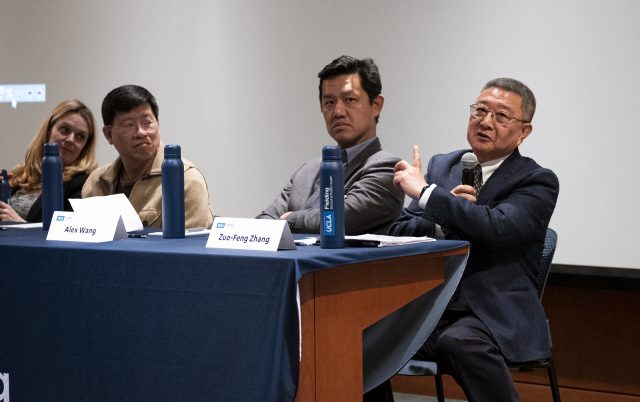UCLA faculty from the Fielding School of Public Health and the UCLA Center for Chinese Studies countered misinformation surrounding the coronavirus to UCLA community members at an event Monday.
The coronavirus, also known as 2019-nCoV, is a virus with common coldlike symptoms, such as coughing and fever. It has infected over 40,000 people and killed over 1,000 since it was first detected in December, originating from wild animal markets in Wuhan, China.
The United States suspended entry of most noncitizen travelers coming from China on Jan. 31, according to the National Public Radio. Additionally, the coronavirus was declared a public health emergency Jan. 31.
The UCLA event, “The Novel Coronavirus: What Do We Know and What’s Next?” was livestreamed and open to the public in order to make the information accessible, said Michael Berry, the director of the Center for Chinese Studies.
Currently, 13 cases have been confirmed in the U.S., with seven cases in California.
In addition to professors of the School of Public Health and the Center for Chinese Studies, faculty from the David Geffen School of Medicine at UCLA and the UCLA School of Law gave presentations on the virus from the perspective of their fields then held a panel to answer questions from the audience.
Travel restrictions and animal produce market shutdowns in China could create additional problems for public officials, said Anne Rimoin, a professor of public health who spoke at the event. People often find ways around regulations, making it difficult to monitor, she added.
Rimoin added the best way to protect oneself from infection is with hand-washing. Additionally, Rimoin said she recommends avoiding nonessential travel to China.
Otto Yang, a professor of medicine who also spoke at the event, said the coronavirus has a 2% mortality rate. However, this figure is considered inaccurate because many cases go undiagnosed or have undetected symptoms, Yang said.
He added most fatalities come from patients with already-compromised immune systems, but some previously healthy individuals have died from the virus.
Alex Wang, a law professor at UCLA, said there are a lot of conflicting narratives about China’s response to the coronavirus, including controversies regarding the construction of a coronavirus hospital and unequal distributions of masks.
Controversies stemming from coronavirus have not been limited to China. Misinformation has rapidly spread across the internet in the months following the virus’ spread.
In January, an email claiming a USC student was infected with the coronavirus was heavily circulated through social media and eventually found to be fake. In a similar occurrence later that month, a fake letter claiming an outbreak occurred in the South Bay Area spread on Facebook.
Students said they came to the event to hear from experts because of the misinformation surrounding the coronavirus.
Nathan Paredes-Kao, a second-year computer science and engineering student, said he hears many different statistics about the number of people who are getting infected and thinks there should be more reliable sources of information.
“Every day I hear, ‘Oh, there was a case of coronavirus in X location, which is X miles away from where I am,’” Paredes-Kao said. “It’s nice to have a foundation of what is and isn’t true.”
Natalie Penn, a second-year neuroscience student, said free events on current issues are useful to help inform students.
“There is really a chance to get ahead of this and there is a chance to help people and there is a chance to heal,” Penn said. “If we can keep the panic down and keep the alertness high, it seems like it’s going to hold off.”
Berry said there is a lot of misinformation on the internet and thinks people should be wary of where they look for updates.
“When panic sets and people are desperate for information, often they’ll latch onto whatever they can find,” Berry said. “But we should all be very wary of where this information is coming from.”

